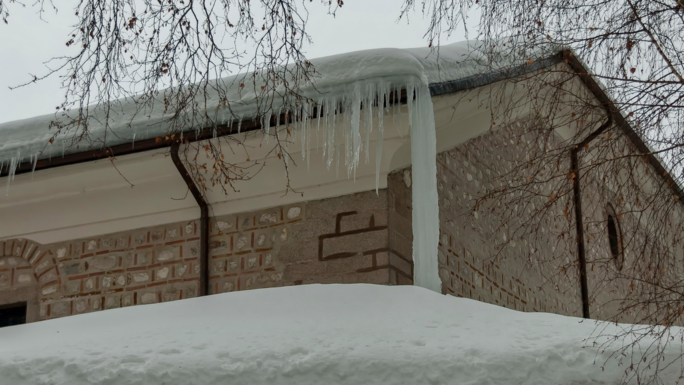We hate to burst your bubble, but burst pipes are a real possibility during the winter months. Lowering your thermostat during cold weather doesn’t always save you money. In fact, it could actually cost you thousands of dollars! Trust us – we’re all about keeping the thermostat at a comfortable 68 degrees, but we have two words for you: frozen pipes. Don’t let your water supply lines freeze this winter, and keep reading on how to prevent your pipes from freezing.
The Dangers of Frozen Pipes
Even if you’re brand new to homeownership, there’s one thing you should know. A frozen pipe or broken pipes are not good. The first thing to worry about is water damage from the freezing pipes bursting. Not all frozen pipes burst, but often homeowners discover this problem after it’s too late. Despite how hard you try to sop up the water, the moisture may lead to structural damage and mold, especially in dark, damp places like crawl spaces. This type of damage can be extremely costly. Most homeowner insurances do not cover damage from frozen pipes bursting unless the homeowner can prove they took the proper measures to prevent the pipes from freezing.
Cold Air? Know These Common Warning Signs of Frozen Pipes
How do you know if your home is in trouble?
- Strong odor coming from drains
- Strange noises when you turn on the water
- Condensation or frost on exposed water pipes
- Water damage in the ceiling or walls
Are you in danger of your pipes freezing this winter? A no-cost Mass Save Energy Audit will help locate where cold air is sneaking into your home, like your exterior walls. Not to mention, Wattson Home Solutions’ technicians will provide pipe insulation and install it to your water pipes for free.
My House Isn’t That Cold. How Can My Pipes Freeze?
The most common misconception is that your House has to be 32 degrees or less for pipes to freeze. After all, that’s how cold water has to be to freeze, and that’s what your pipes are carrying.
Homeowners who have semi-exposed or completely exposed pipes should be concerned about them freezing, especially if they have little or no insulation. Perhaps your water pipes are sealed tight behind closed walls. That doesn’t always mean they’re safe. Water pipes that run close to the exterior walls, such as near dryer vents, risk freezing. Even a cold breeze from a non-sealed window can do the trick.
Tips and Tricks to Prevent a Frozen Pipe
Over the past few years, Worcester has experienced quite a few sub-zero temperature days. We recommend taking extra precautions during a cold snap or when it dips below 20 degrees outside. A surefire way to prevent frozen pipes is to install additional insulation in your home, insulate pipes, and have your home professionally air-sealed. Do you want to make sure that your home is protected at all costs?
Follow these tips, especially if you’re living in an older home.
Leave a faucet running slightly.
Prevent frozen pipes by keeping water flowing through your pipes. Have you ever noticed that pond water freezes a lot faster than rivers? That’s because moving water is harder to freeze. To prevent wasting too much water, leave just one faucet on with a cold water drip and leave it at only a trickle.
Keep the cabinet doors below your sink open.
Do you live in an older, historic home? Leave the kitchen and bathroom cabinet doors open to allow warm air to flow around your sink’s pipes. A portable space heater can also help keep pipes from freezing.
Don’t set your thermostat below 55 degrees.
Are you planning to be out of town at some point this winter? Make sure to keep your pipes warm and don’t turn down your thermostat for long periods of time. You may save some costs on heating bills, but you could pay for it if your pipes freeze and burst while you’re away. Turn up the heat and prevent pipe freezes while you’re away.
Keep your home at the same temperature.
We often advise homeowners to lower their thermostats a few degrees at night and when everyone is away at school or work. But for those extra chilly days, keep a steady temperature. Sure, your heating bill may be a little more expensive that month, but you will have avoided thousands of dollars in damage and repair costs from frozen pipes bursting.
Garden hoses should be drained, disconnected, and stored.
Drain and disconnect garden hoses before cold weather comes. Even though it’s outdoors, a frozen garden hose can impact your home’s entire plumbing system. So, to prevent pipes from freezing, store your hose until the spring and turn off those outdoor faucets.
Place a cover over outside spigots, faucets, or exposed pipes.
Water supply lines are vulnerable to freezing when cold weather hits. To prevent those vulnerable pipes from freezing, invest in pipe insulation and cover faucets or spigots to prevent cold air leaks.
Use a space heater.
A simple space heater can keep pipes from freezing. Anywhere you have exposed pipes, prevent freezing by covering them with insulation or place a space heater near them to ensure they stay warm. This isn’t to heat the room but to make it just warm enough to prevent pipes from freezing.
Keep your garage doors closed.
When you aren’t using your garage, keep your garage doors closed, so you don’t let the cold air inside and expose your pipes to unnecessary cold temperatures.









